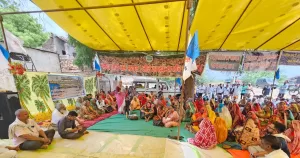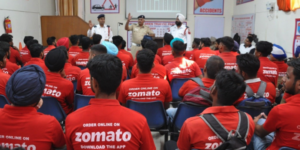Privatisation of Public Sector Banks Would Run Counter to the Constitutional Obligation of the Govt
In the Budget speech last year, the Finance Minister mentioned that the government would privatise a few PSU banks in due course. There are reports on statements originating from the Ministry that the government would introduce a Bill during the coming monsoon session for enabling it to privatise PSU banks in principle, create provision for outright sale and relax the cap on foreign equity holdings in them. DIPAM is also conducting road shows in the USA to sell IDBI Bank.
In this connection, we wish to caution the government about the legal and other far-reaching implications of privatising any PSU bank.
When private banks were nationalised in 1969, the then government had informed the Parliament that “The money which depositors entrust to the banks are in the nature of a sacred trust“. “The operations of the banking system should be informed by a larger social purpose, and should be subject to close public regulation”, it would serve the purpose of “severing the link between the major banks and the bigger industrial groups” which had so far controlled credit, “the interests of the depositors of the banks which have been nationalised, will not only continue to be fully safeguarded but will now have the backing of the State itself”.
Those considerations have since become far more relevant, in view of the large sections of the disadvantaged households not being able to access affordable credit facilities even today, and in view of the fact that income inequalities and concentration of wealth have since increased, not decreased.
Due to a lack of access to credit, people use loan apps which use dubious methods and exorbitant interest rates, which has led to suicides.
As expected at the time of nationalisation, the PSU banks continue to play a vital role in promoting the welfare function of the State, as visualised in the Constitution.
From the point of view of the legal implications, one should remember that the PSU banks are entities set up under Article 19(6) (ii). Coming within the ambit of Article 12, they are deemed to be an arm of the State. As such, they are an instrument of the State in promoting the welfare role spelt out in the Directive Principles, especially Article 38(1) [“promote the welfare of the people”], Article 38(2) [“minimise the inequalities in income”], Article 39(b) [“the ownership and control of the material resources of the community are so distributed as best to subserve the common good”], Article 39(c) [“that the operation of the economic system does not result in the concentration of wealth and means of production to the common detriment;”]. In addition, they are also subject to the provision relating to reservations for the SCs/STs/OBCs under Article 16.
We would caution the government that the move to privatise public sector banks would run counter to this constitutional obligation, and even amount to reneging on it.
The PSU banks employ around 8.26 lakhs of personnel including those belonging to the SCs/STs/OBCs/EWSs and implement reservation policy strictly. A significant portion of them occupies managerial positions in those banks. Reservations in employment need to be viewed, not merely from the point of view of the creation of employment opportunities alone but, more importantly, from the larger socio-economic benefit of empowering and uplifting them. Privatisation of even a single PSU bank would not only create uncertainty regarding the conditions of service of the existing SC/ST/OBC employees (as also similar uncertainty in the future of all other employees) but also permanently close the Constitution-given opportunity for new recruitments to that extent.
Households, especially from the low and middle-income groups, deposit their savings in the PSU banks, on the assumption that those banks are a part of the State and, therefore, their deposits would enjoy sovereign backing. In fact, as already indicated, that was the solemn assurance given to the Parliament by the government in 1969 when it nationalised the private banks. A unilateral decision on the part of the government now to privatise a PSU bank, without the consent of the depositors, would therefore constitute a breach of the trust reposed by the depositors in the bank and in the sovereign government backing it. Such a step may not be legally sustainable.
It is worth recalling the way the private promoters of the much-touted Global Trust Bank had let down the bank’s unfortunate depositors, and the RBI and the Ministry had to direct a PSU bank in 2004 to rescue whatever had been left of that errant private bank. The recent Yes Bank fiasco is another example where a PSU bank had to save a failing, mismanaged private bank.
When private banks were nationalised, the then government had consciously stated in the Parliament, as indicated above, that the purpose of bank nationalisation was to “sever the link” between the banks and the industrial groups to whom they give credit. Privatising a PSU bank would amount to restoring such an egregious link, which involves a clear conflict of interest. The way the government has so far gone about privatising the CPSEs points to the absence of any due diligence.
Several corporate business houses stand heavily indebted to the PSU banks. Many of them have been classified as NPAs, largely the outcome of outright fraud committed on the PSU banks, and the ongoing statutory resolution process has imposed heavy liabilities on them. Even now, the names of defaulters whose huge loans have been written off are not made public.
As per GOI presentation the operating profit of 12 PSU banks, excluding IDBI and Regional Rural Banks in March 2022 is Rs.2,08,591 crores and net profit is Rs.66,541 crores which doubled in a year. Huge dividends and taxes are paid by these banks to the government.
Their market share in deposits is 62% and in advances, it is 58%. Their NPA provisions are 0.9% at par with private banks despite the PSU banks also discharging several welfare functions enjoined upon them by the Directive Principles. What is needed is an increase in the number of branches and staff along with an improvement in the credit deposit ratio.
LIC has invested 51% share in IDBI at the cost of Rs.61 per share and has turned around the failing bank. Laws should be amended if needed to allow LIC to own the bank permanently, as banks have been allowed to run insurance companies. The government cannot discriminate. Selling IDBI Bank to foreign investors through road shows is against the declared policy of self-reliance.
Hence, we appeal to the government not to bring the bill to Parliament and not to privatise public banks. We also appeal to the government to allow LIC to run IDBI successfully.
Government should also learn lessons from the disaster it has created through the 3.5% IPO of LIC.
The People’s Commission on public sector and public services also appeals to the political parties, Members of Parliament of all political parties, trade unions and civil society to take up the issue in the interest of the people.
(About Peoples’ Commission on Public Sector and Public Services (PCPSPS): The Commission includes eminent academics, jurists, erstwhile administrators, trade unionists and social activists. PCPSPS intends to have in-depth consultations with all stakeholders and people concerned with the process of policy making and those against the government’s decision to monetise, disinvest and privatise public assets / enterprises and produce several sectoral reports before coming out with a final report. Members of the commission include: Dr. Thomas Isaac, Former Finance Minister, Kerala (Co-Chair); E.A.S. Sarma, Former Secretary, Ministry of Power & Economic Affairs, Govt of India (Co-Chair); and many other intellectuals. Courtesy: Reclaim the Republic, a Platform of Trade Unions, Peoples Movement’s and Civil Society wanting change in the present path of economy, development, politics and want a decentralized, distributed democratic path where Public, Public Sector and Public Services have a major role.)




